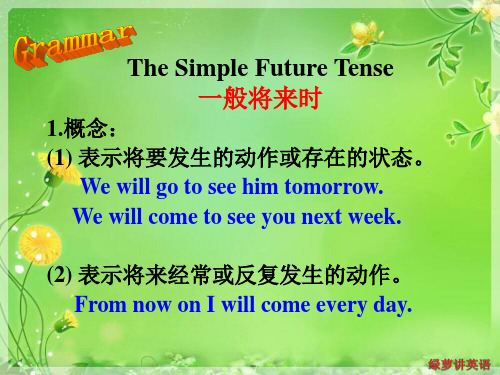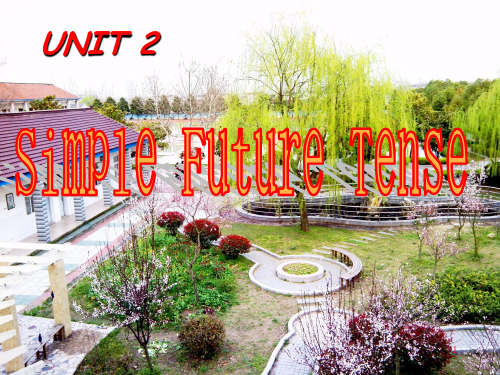一般将来时be_going_to_与will的解析和练习PPT精品文档
初中英语be-going-to与will的用法及区别-课件PPT

基本结构
be going to+动词原形
shall/ will +动词原形
2021/8/26
1
表示将要发生的动作和情况,通常和表示将来的时间状语连用!
常用的时间副词
tomorrow, the day after tomorrow, in the future
9
will 表意愿
will 表意愿,一个当机立断的决定--突发事件,灵机一动
The telephone is ringing. I will get it.
随机应变
My father is knocking the door, I will open it.
2021/8/26
10
will 表意愿
2021/8/26
7
will 与be going to 的区别
在时间与条件状语从句中常用will
If it doesn't rain tomorrow,we will climb the hill.
when my mother comes back , I will go to bed.
动词表示内心活动时, 表示猜测的句子必须用“will
I think she will like the cake I made for her.
1. will还可以表示主动为他人做某事或是给出一个承诺,可以翻译成“为”、“会” It is very cold, I will make you some hot coffee. 他
2在没有迹象表明的情况下进行的猜测用“will,be going to “都可以 I think the weather will be nice. I t20h2i1n/8k/2t6he weather is going to be nice.出一个承诺,可以翻译成“为”、“会 8
一般将来时课件(PPT)

“be able to”表示将来有能力做某 事时,使用一般将来时形式,例如“I will be able to help you”。
情态动词如“can”、“may”、 “must”等,在一般将来时中通常直 接加动词原形,例如“I can swim”。
03
一般将来时在句子中的运用
陈述句中的使用
表示将要发生的动作或存在的状态
纠正方法
应使用正确的将来时形式,如 "He will go to the park tomorrow." 或 "He is going to the park tomorrow."
忽略动词变化规则
错误示例
They will play football in the future.(忽略了动词play在将来时中的变化)
纠正方法
在将来时中,应使用正确的助动词或情态动词形式,如 "I will be able to help you with your homework." 或 "I can help you with your homework."
错误示例
He will must finish his work before leaving.(错误地使 用了情态动词must)
作用
用于表示未来的计划、打算、预测、 假设等。
常见表达形式
will + 动词原形
表示将来的动作或状态,如“I will go to the park tomorrow.”(我明天将去公园。)
be going to + 动词原形
表示计划、打算或即将发生的动作,如“I am going to study hard this semester.”(我这 学期打算努力学习。)
一般将来时PPT课件

•一般将来时基本概念•一般将来时结构与用法•一般将来时时间状语及标志词•一般将来时与其他时态对比•一般将来时在各类从句中运用•一般将来时误区及注意事项•总结回顾与拓展延伸目录01一般将来时基本概念定义与特点定义特点表现形式will + 动词原形be going to + 动词原形现在进行时表示将来预测未来计划与安排条件与假设030201使用场景02一般将来时结构与用法主语+ be not going to + 动词原形+ 其他成分主语+ be to not (非标准用法,尽量避免使用) + 动词原形+ 其他成分主语+ will not (won't) + 动词原形+ 其他成分Will + 主语+ 动词原形+ 其他成分?Be + 主语+ going to + 动词原形+ 其他成分?Be + 主语+ to + 动词原形+其他成分?(较少使用,多用于书面语)特殊疑问词动词原形特殊疑问词going to +成分?特殊疑问词to +(较少使用,多用于书面语)注意:在一般将来时的使用中,要注意区分不同语境和表达方式的细微差别,选择合适的结构进行表达。
同时,也要注意与其他时态的区分和联系,避免混淆使用。
特殊疑问句结构03一般将来时时间状语及标志词常见时间状语表示将来的时间状语表示计划或安排的时间状语标志词识别与运用04一般将来时与其他时态对比与现在进行时对比时间指向不同01动词形式差异02使用情境不同03时间基准差异动词形式变化使用情境区别时间范围不同动词形式区别使用情境差异05一般将来时在各类从句中运用在宾语从句中运用01 02定语从句的时态取决于它所修饰的先行词,如果先行词是将来时态,定语从句也使用将来时态。
如果先行词是过去将来时,定语从句则使用过去将来时。
定语从句中表示将来的时间状语有:tomorrow, next year, in the future 等。
06一般将来时误区及注意事项误区二过度使用“will”和“going to”。
一般将来时课件ppt(共17张PPT)

Jim going to
afternoon?
in the playground tomorrow
4. .Jim is going to play football in the playground tomorrow afternoon.
Jim going to play football tomorrow afternoon?
2)在浊辅音和元音后读/d/.
一般过去时, 要用动词过去式. Jim is going to play football in the playground tomorrow afternoon.
Jim is going to play football in the playground tomorrow afternoon. ⑵are变为were。
there were many beautiful flowers there. 一般将来时表示将来某个时间要发生的动作或存在的状态常与表示将来的时间状语连用
⑴am ,is变为was。
So she They to read some books.
What did they do in the park? 1)在清辅音后读/t/ .
(3).动词过去式变化规则
a)一般情况下,直接加ed.如:wash--washed, look---looked; b)以不发音字母e结尾的,加d.如:like---
liked, dance---danced; c)以“辅音字母+y”结尾的,变y为i再加ed. 如:study---studied;
food and (play) lots of games. They
(come) home at 4:30.
一般将来时PPT课件

一、单项选择
(C) 1. There __________ a meeting tomorrow afternoon.
A. will be going to B. will going to be C. is going to
shall常用于第一人称. shall
否定式:shall not = shan’t
will常用于第二、三人称,但在 will 口语中各种人称都可以用will.
否定式:will not = won’t
四、现_在___进__行___时态 + 表示将来的时 间状语也可以表示将来。
五、There be 句型的一般将来时态 的结构:there +is_g_o_in_g_to_ + be + 名词或there + will+ be + 名词。
begoingto表示根据主观判断将来肯定发生的事情表示根据主观判断将来肯定发生的事情will表示客观上将来势必发生的事情
The Simple Future Tense
一、一般将来时表示将来某一 时刻的动作,状态以及打算。 该时态一般与表示将来意义 的时间状语连用。如:
tomorrow, this month, the day
next week.
A. will be; is
B. is; is C. will be; will be D.
is; will be
(D) 4. There ________ a dolphin show in the zoo
tomorrow evening.
A. was B. is going to have C. will have D. is going
初中一般将来时ppt课件

there be
❖ There (is going to) be a beautiful park.
❖
will
❖ There are going to be many beautiful parks.
15
祈使句+ and/or+将来时(will)
❖ 努力工作否则你就会失败。 ❖Work hard or you will fail(失败). ❖ 努力工作你就会成功。 ❖Work hard and you will succeed(成
一般将来时
1
一般将来时的意义:
❖用来描述一个即将要发生的动作; 谈论未来的计划和打算;表示将 来某一时刻的动作或状态。
2
二、一般将来时的基本结构:
will/shall+动词原形 I/we+shall be going to+动词原形 be not going to+动词原形
3
其他形式
1.be+to do 表示计划,责任,约定或命令
earth if people don’t protect the
environment. (较远未来)
8
四、一般将来时在使用中的一些注意事项:
❖4、be going to do 用于表示计划、打
算去做某事(强调主观意愿);还可以 表示根据事实情况极有可能发生的事。 如: ❖ I’m going to take another plan.(计划) ❖ It’s so cloudy. I think it’s going to rain. (根据事实极有可能发生)
He will do dull He won`t do
初中英语一般将来时will和be going to讲解课件

going to, 而多用will。 如:
If any beasts comes at you, I'll stay with you and help you.
1.Bob and I _w__il_l_m__a_tc_h__(watch) an action movie tomorrow.
2.We __w__il_l _b_e____(be) able to go to space in the future.
时间状语:
tomorrow 明天
next week 下周
next month 下个月 next year 明天
before不久
soon 不久
the day after tomorrow 后天
the year after next 后年
the week after next 下下周
基本句型: 肯定句: 主语 + will +v. 原形 否定句: 主语 + will +not + v.原形 一般疑问句: will +主语 + v.原形
3.The childrenw_i_ll_d_i_s_cu__ss__(discuss) the plan after school.
He is seriously ill. He is going to die. He will be twenty years old.
一般将来时课件PPT(详细+练习)

• I will not tell it to him tomorrow.
I am not going to tell it to him tomorrow.
• She will go to school by car next week.
5、Are they going to make a snowman this holiday?
5、
No, they are going to fly kites this holiday.
The end
Thank you!
注意:won’t=will not
变特殊疑问句
They will have an English party next week.
①
②
③
① Who will have an English party next week ? ② What will they have next week ? ③ When will they have an English party?
What is The Simple Future Tense?
Past过去
①Will ②Be going to
Future未来
V.动词原形
Now 现在
• I will call you this evening. • I am going to call you this evening. • Students will use computers to learn in the future.
the future.
通用版 小学英语小升初 语法句型转换-一般将来时 课件(共27张PPT)

通用版小学英语小升初语法句型转换-一般将来时课件(共27张PPT)(共27张PPT)一般将来时simple future tense一般将来时表示:①将来某个时间要发生的动作或存在的状态,②也可以表示将来经常发生的动作,③常与表示将来的时间状语连用。
一般将来时的定义be going to +动词原形表示打算、准备做某事或即将发生/肯定要发生某事。
当主语是I 时,be 用am;当主语是第三人称单数时,be 用is;当主语是其他人称时,be 用are。
2. will/ shall +动词原形表示将要发生的动作或情况,没有太多的计划性,还可用来表示意愿。
主语是第一人称时常用shall,也可用will;其他情况全部用will。
一般将来时的句式结构(1)肯定句一般将来时的句式结构如:I am going to the cinema tonight.今晚我打算去电影院。
My brother is going to buy a pair of shoes this afternoon.今天下午我哥哥打算去买一双鞋。
主语+ be going to +动词原形.一般将来时的句式结构(2)否定句:主语+ be + not going to +动词原形+其他.如:I am not going to plant trees this weekend. 这个周末我不打算去种树。
They aren’t going to climb mountains this week.这周他们不打算去爬山。
(3)一般疑问句及答语:be动词提前,剩下照抄,句末挂问号。
Be +主语+ going to +动词原形+其他肯定回答:Yes, 主语+ is/ are/ am.否定回答:No, 主语+ isn’t/ aren’t 或I’m not.一般将来时的句式结构(3)一般疑问句及答语:如:—Are you going to the park next week下周你打算去公园吗?—Yes, I am. 是的,我打算去。
一般将来时课件

am is are
Practice
1.我打算今天下午去跳舞。 I am going to dance .this afternoon. 2.Tom打算明天六点起床。 Tom is going to get up at six tomorrow. 3.我们打算两周后去野餐。 3.We are going to have a pinic in two weeks.
will型
定义:将要发生的动作或状态 . 结构:主语+will+动原+其他 .
助动词
否定句:主语+will not+动原+其他?
1.She will go to dance tomorrow. She will not go to dance tomorrow.
2.I will go swimming with Tom next week . I will not go swimming with Tom next week.
4. She will listen to music in the room after school.(划线提问) __W__h_a_t__ _w_i_l_l ___ she _d_o______ after school?
茫茫人海 该如何一眼认出它呢?
时间标志词
He will be come back soon . I am going to do my homework tonight. We will succeed in the future. I am going to execise tommorrow morning. We are going to have a picnic next week. He will come home in two days.
一般将来时课件PPT

Functional Practise:
1.Students will go to school in the future.(一般疑问句) _W_ill st_ude_nts _go_ to school in the future. 2.There will be some robots in our homes.(改为否定句) There _wo_n`t _be_ a_ny_ robots in our homes. 3.Everyone will have a small car.(对划线部分提问) _Wh_at _wi_ll everyone _hav_e ?
[注意]:无论后面加单数名词或复数形式,be都必须用原
形。
There will be only one country. There is going to be a football match tomorrow.
注意:在口语中,所有人称都可以用will.
be going to+动词原形”和“will+动词 原形” 的区别
❖ 一般疑问句:把be 动词提到句子主语之前,结尾变问号。
❖
Are you going to have a picnic tomorrow?
will 引导的一般将来时:表示将来发生的动作或存在的状态, 最基本的结构:will + 动词原形 肯定句:主语+ will +动词原形+(宾语)+其他
Some day people will go to the moon . 否定句:在will 的后面加not即可。will not 可缩写为 won’t
❖ 3)in+一段时间(回答how soon) ❖ 4)in the future ❖ 5)this Sunday/evening ❖ 6)from now on ❖ 7)one day, someday (未来的)某天 ❖ 8)soon
最新一般将来时-be-going-to-be-to-do-主将从现课件PPT

3. be to do 将要发生的事;必然要发生的事; 打算 The book I edited is to publish soon.
1.My son has a pain in his stomach and is g_o_i_n_g_t_o_ have an X-ray. 2.It’s ten o’clock and I’ve got a
headache. I think I _w__il_l_ take an aspirin.
2. be going to do
1) 用来表示主观上打算在将来某个时 候做某事。 We’re going to pick apples next Wednesday.
Hale Waihona Puke 2)用来表示即将发生的事 The twins are going to meet Kate at the station at 7:00.
3. I’ve thought about it a lot and I __a_m__g_o_i_n_g_t_o___ start diet tomorrow. I want to lose weight.
4. My daughter has decided to study medicine. She __is_g_o_i_n_g__to___ be a doctor.
– Let’s go out to play football, shall we?
一般将来时讲解PPT课件

A. are going to do B. shall do C. do D. are doing
4. Look at the clouds! It ____________.
A. rains B. will be rain going to rain
C. will raining D. is
5.--- you free tomorrow? ---No. I free the day after tomorrow.
--- My car won’t start. ---Don’t worry, I will c.ome and give it a push7 .
will 引导的一般将来时:表示将来发生的动作或存在的状态, 最基本的结构:will + 动词原形
“主谓(宾)句型”的一般将来时:
肯定句:主语+ will +动词原形+(宾语)+其他
be going to + V.原形
由主语决定
I
am
You
are
He/She
is
going to …
We
are
They
are
.
12
My weekend plan:
1.I am not going to fly kites. 2.I am not going to play football. 3.I am not going to visit the museum. 4.I am not going to have a picnic.
3.There__ a basketball match this afternoon. B
A.will have B.will be
一般将来时be_going_to_与will的解析和练习知识讲解

否定句式:
There isn’t going to be a sports meeting at our school next week.
四、使用be going to 应注意的两点 1. there be句型中going to 后面的be不能改为have 例如:
特殊疑问句结构:
特殊疑问词+will +主语+动词原形+其他?
四、there be句型的一般将来时 1. There is/are going to be
如:There is going to be a sports meeting at our school next week.
一般疑问式:
Is there going to be a sports meeting at our school next week?
3. __Is__ Tom _g_o_i_n_g__to__p_la_y_ (play) football with us tomorrow?
4.There _a_r_e_g_o_i_n_g_t_o__b_e_ (be) strong winds tonight.
5.He _is__g_o_in_g__to__b_e_ (be)back in three hours.
2. There will be
(2).变一般疑问句 把will 提到句首,原句照抄结尾变问号。
They will have an English party next week. Will they have an English party next week?
Yes, they will. / No, they won’t.
一般将来时课件PPT

情态动词练习
总结词
理解情态动词在否定句中的作用
详细描述
解释情态动词如"can't", "won't", "shouldn't"等在否定句中的用法,并 通过例句和练习加深学生对情态动词 的理解。
助动词will练习
总结词
熟悉助动词"will"的否定形式
详细描述
介绍助动词"will"的否定形式"won't", 并通过例句和练习让学生熟练掌握其 用法,如"He won't come tomorrow."等。
助动词will练习
总结词
掌握助动词的用法
详细描述
通过助动词"will"的练习,学生可以进一步了解助动词在一般 将来时中的用法。学生将学习如何正确使用助动词与其他时 态连用,如过去将来时和将来完成时。
05
一般将来时的否定句练习
简单句练习
总结词
掌握简单句的否定形式
详细描述
通过例句和练习,让学生掌握一 般将来时的简单句否定形式,如 "I will not go to the party."和 "She will not buy that car."等。
结构
一般将来时的基本结构是“主语+will+动词原形”,有时也可以用“be going to+动词原形”来表示。
特点
预测性
不确定性
一般将来时主要用来表示对未来的预 测,包括个人的预测、科学的预测和 基于事实的预测。
一般将来时也可以表示对未来事件的 不确定性,例如“I will see you later, but I'm not sure when.”。
一般将来时结构.ppt

A D 5. There will only be one country.
A D 6. People will live to be 200 years old.
1b. Listen and circle the predictions you hear in activity 1a.
1. People will have robots in their homes. 2. People won’t use money. Everything will be free. 3. Books will only be on computers, not on paper. 4. Kids won’t go to school. They’ll study at home
on computers. 5. There will only be one country. 6. People will live to be 200 years old.
1c PAIRWORK Ask and answer questions about the predictions in activity 1a.
时态:一般将来时 The Simple Future Tense
3、 shall与will的区别:
shall常用于第一人称 shall 否(w定e/式I ):. shall not = shan’t
缩略形式 ’ll
will常用于第二、三人称,但在 will 口语中各种人称都可以用will.
否定式:will not = won’t
- 1、下载文档前请自行甄别文档内容的完整性,平台不提供额外的编辑、内容补充、找答案等附加服务。
- 2、"仅部分预览"的文档,不可在线预览部分如存在完整性等问题,可反馈申请退款(可完整预览的文档不适用该条件!)。
- 3、如文档侵犯您的权益,请联系客服反馈,我们会尽快为您处理(人工客服工作时间:9:00-18:30)。
He _w__il_l _b_e_ in Shanghai tomorrow. (be)
.
6
二、一般将来时的构成:
1. be going to + 动词原形 2.助动词will + 动词原形
.
7
一、be going to 的用法点拨 be going to 是一种固定结构,后面接动词原形“准备;
will 引导的一般将来时表示将来发生的动作或存在的状态 结构:will + 动词原形
肯定句:
主语+ will +动词原形+其他
I will go to Hongkong.
否定句:
在will的后面加not即可。 will not可缩写为 won’t
I will not go to Hongkong.
.
10
(2).变一般疑问句 把will 提到句首,原句照抄结尾变问号。
They will have an English party next week.
Will they have an English party next week?
Yes, they will. / No, they won’t.
5.He _is__g_o_in_g__to__b_e_ (b.e)back in three hour1s5.
打算”的意思。含有be going to 结构的句子中往往有表 示将来的时间状语。
二、be going to 在肯定句中的形式
be going to 结构中be一般有三种形式, 即:am , is , are 。当主语是 I 时用am ;当主 语是第三人称单数时用is;当主语是you或复 数时用are。
.
5
Please look at the sentences
我今年12岁.
I _a_m__ 12 years old this year.(be) 我明年13岁. I _w_i_ll__b_e_ 13 years old next year. (be)
他现在在北京。
He __i_s_ in Beijing now.(be)
3
一、什么是一般将来时?
future
past now 一般将来时态表示在将来某一时间将发 生的动作或存在的状态。
He is going to/will watch TV tomorrow evening.
.
4
我们除了用“be going to+动词原形”可 以表示一般将来时外, 我们还可以用“will+动 词原形”来表示一般将 来时.
The Simple Future Tense
一般将来时
.
1
一般将来时态
所有时态都是通过
动词
变化来体现的
.
2
future past now He often watches TV at night.
一般现在时
future
past now He is watching TV now.
现在进行. 时
在进行时表示将要发生的动作,它们很少与be going to 结 构连用。例如:
Miss Sun is coming tonight. 今晚孙小姐要来。
.
14
用所给词的适当形式填空:
1.There _is__g_o_in_g__to__b_e_ (be) an American film next week.
.
13
四、使用be going to 应注意的两点 1. there be句型中going to 后面的be不能改为have 例如:
There is going to be a football match next Saturday
in our school.
下周六我们学校将有一场足球比赛。
2. come, go, leave, arrive等表示位置移动的动词常用现
回答: (肯) Yes, 主语 + will. (否) No, 主语 + won’t.
.
11
(3).变特殊疑问句
They will have an English party
①Who will have an English party next week?
② What will they have next week? ③ When will they have an English party?
Is there going to be a sports meeting at our school next week?
回答:
Yes, there is. / No, there isn’t
否定句式:
There isn’t going to be a sports meeting at our
school next week.
.
8
三、be going to 的否定句和一般疑问句的变法
在be (am, is, are) 的后面加上not 就构成了否定句;
把be (am, is, are) 提到句首,在句末加问号就构成了 一般疑问句.
例如:
They are going to see the car factory next week. (肯定句)
特殊疑问句结构:
特殊疑问词+will +主语+动词原形+其他?
.
12
四、there be句型的一般将来时 1. There is/are going to be
如:There is going to be a sports meeting at our school next week.
一般疑问式:
否定句They are not going to see the car factory next week.
一般疑问句及其回答 —Are they going to see the car factory next week?
—Yes, they are. (No, they aren't.)
.
9
2.They _a_r_e_g_o_i_n_g__to__fi_n_i_sh__ (finish) the work this afternoon.
3. __Is__ Tom _g_o_i_n_g__to__p_la_y_ (play) football with us tomorrow?
4.There _a_r_e_g_o_i_n_g_t_o__b_e_ (be) strong winds tonight.
